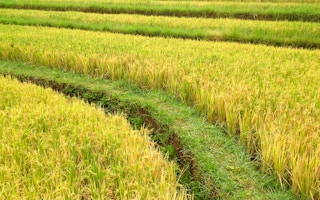Indonesia vowed to uphold the interests of fellow developing nations on agriculture subsidies at the upcoming World Trade Organization (WTO) ministerial summit instead of just playing a good host by brokering a deal.
Trade Minister Gita Wirjawan said Tuesday that Indonesia would continue to throw its weight behind the indefinite time line of a temporary solution expected by the G33 farming alliance.
“We want the interim solution to be in place for as long as possible before a permanent agriculture subsidy solution is agreed upon,” Gita told reporters after a meeting at the Office of the Coordinating Economic Minister.
“As a host we must be able to bridge the interests of developing countries and developed countries, as well as those of least- developed nations and developed countries. But we do embrace the aspirations of developing countries that we should be able to provide subsidies,” added Gita, who will chair the meeting from Dec. 3 to 6 in Bali.
The 46 G33 countries have demanded a change in the threshold of government subsidies from 10 to 15 percent of a country’s total farming output. This will allow them to implement food security programs without penalties even when breaching the subsidy limit.
The new provision will require an amendment to the WTO agriculture agreement, which members realize cannot be completed in Bali. As a consequence, they have agreed on an interim solution, which according to developed nations, particularly the United States, should last four years.
This idea, dubbed a “peace clause”, has met strong opposition from India, a key initiator of the proposal.
Separately, Indonesia Global Justice executive director Riza Damanik warned that Indonesia should not change its bargaining position regarding the peace clause to please developed nations and reach its target as a successful host.
“As the leader of the G33, Indonesia should not lower the demands in the G33 proposal and ask developed countries to offer more flexibility in order to achieve a deal,” Riza said.
“This will be the worst diplomacy ever in our history. It will harm us as well as people in other fellow developing countries,” he said.
WTO talks on a worldwide trade agreement in Geneva reached an impasse due to last-minute backtracking although a deal might still be possible, WTO director general Roberto Azevedo said Tuesday, Reuters reported.
Members disagreed on the duration of the proposed interim solution and issues relating to trade facilitation aimed at streamlining customs procedures.
Agriculture and trade facilitation packages, along with a least-developed countries package, are elements of the Doha Round of trade talks and it is hoped that an agreement on them would breathe a lease of new life on the talks, which has remained at an impasse since 2008.
Azevedo is scheduled to meet ambassadors on Tuesday, Geneva time, at a General Council meeting where they would officially hand over the draft deals to the ninth WTO ministerial summit.
Trade Ministry director general for international trade cooperation Iman Pambagyo said that as the text for deal was not ready, ministers convening in the summit would try to resolve the remaining differences over agriculture and trade facilitation.
Indonesia will back agriculture subsidies proposal

Most popular
-

News / Policy & Finance
‘Global politics may change but the principles of nature do not’: Asean banks still hungry for transition-related deals, say CSOs
As a global climate banking alliance softened its stance on mandatory targets, some chief sustainability officers of Southeast … -

News / Energy
No ‘passive bystander’: Clean energy trade among Singapore’s ‘recalibrations’ to tackle new geopolitical reality
The republic will not retreat or “capitulate”, but will forge global cooperation to tackle challenges like climate change, … -

Opinion / Manufacturing
Southeast Asia’s potential role in rare earth elements diversification
Malaysia, Thailand and Vietnam have a sizeable presence in the global REE supply chain – now a geopolitical … -

Podcasts / Carbon & Climate
America’s attack on climate science could affect adaptation capacity in Asia: climate scientist Ben Horton
The sea-level rise expert has moved to Hong Kong – now seen as a gateway to more collaboration … -
 The treaty, signed in 1996, expires next year, and there are unresolved issues with regards to water sharing …
The treaty, signed in 1996, expires next year, and there are unresolved issues with regards to water sharing … -

News / Energy
New record-high US solar tariffs leave uneven impact across Southeast Asia’s solar industry
Cambodia, Vietnam, Thailand and Malaysia's solar panel makers face varying tariff rates. Chinese manufacturers have already moved operations …



